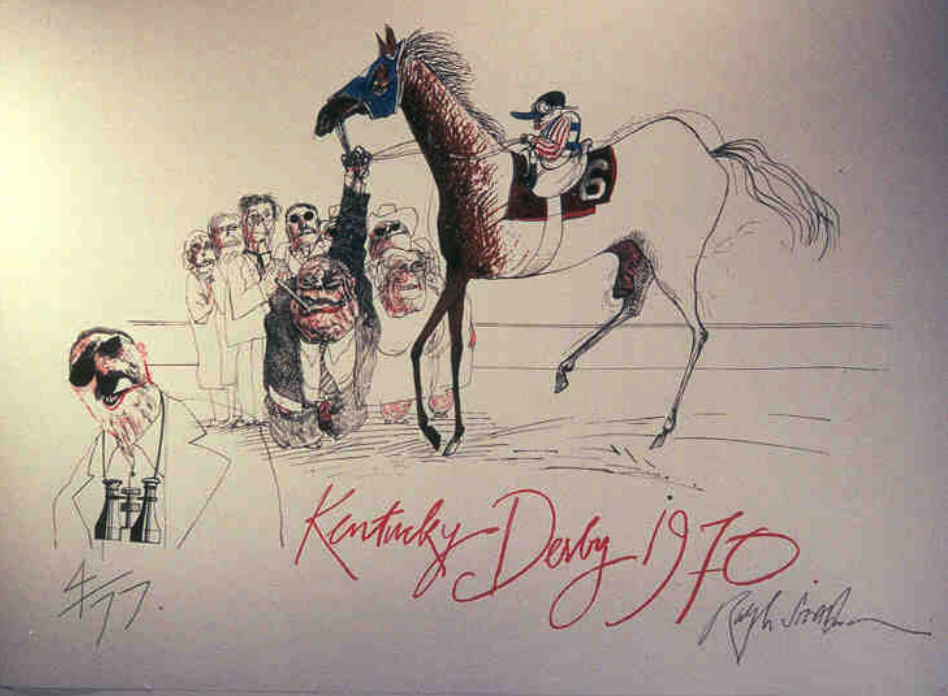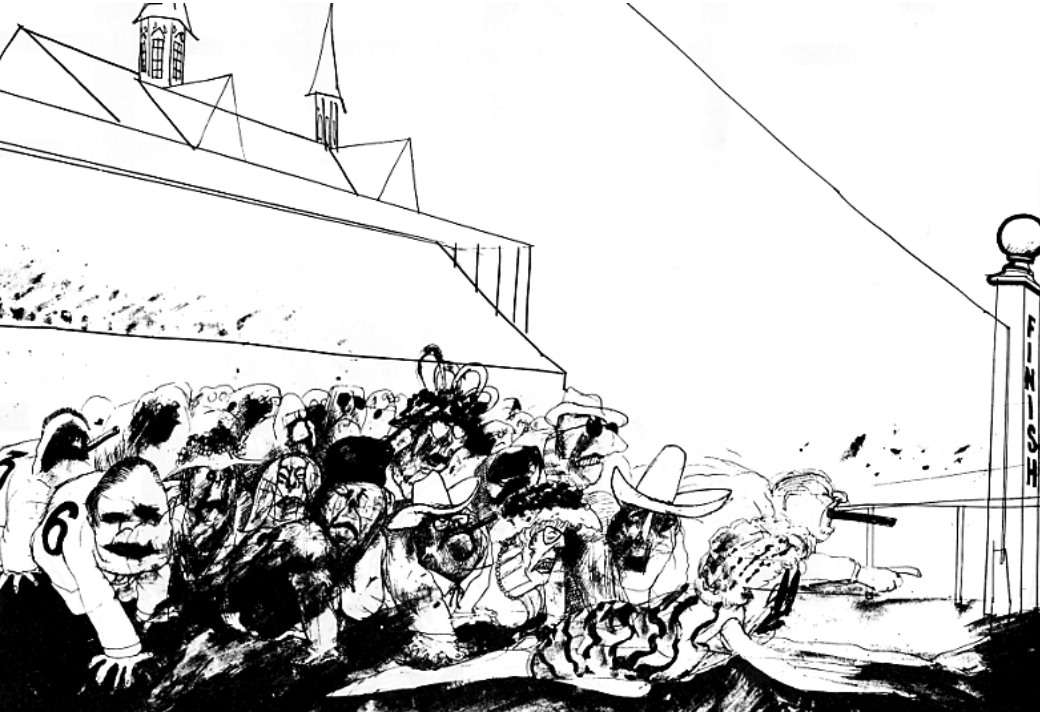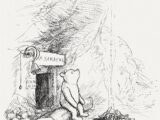The Big Picture –
By Glynn Wilson –
CATOCTIN MOUNTAINS, Md. — On this rainy day in Maryland when I won’t be traveling to Churchill Downs, donning a sear sucker suit or even watching the 148th running of the Kentucky Derby on television — or drinking mint juleps with Mitch McConnell for that matter — the event called “the greatest two minutes in sports” came up on my radar screen on Saturday thanks to an email from a friend.
He called my attention to an article in The New York Times by a writer from Alabama (Rick Bragg, in his first piece for the paper since he quit in New Orleans in 2003) about a book out from an Ivy League author, who both seem worried this week about what the Times called a “racist song” with “deep roots in American culture.”
The Stephen Foster ballad “My Old Kentucky Home” is the state song of Kentucky, and according to other historians, Foster wrote it in 1853 after Harriet Beecher Stowe’s book Uncle Tom’s Cabin came out in 1852, nine years before the start of the Civil War. His original working title was, “Poor Uncle Tom, Good Night!”
While Foster was not a full-throated abolitionist at the time, he certainly wrote the original sorrowful lyrics about a slave family ripped apart by the cruel separation of loved ones during chattel slavery — not for slave owners lamenting the end of the days of slavery.
That didn’t come until 10 years later when President Abraham Lincoln pushed, Congress passed and two-thirds of the states ratified the 13th Amendment to the Constitution: “Neither slavery nor involuntary servitude, except as a punishment for crime whereof the party shall have been duly convicted, shall exist within the United States, or any place subject to their jurisdiction.”
So it is not clear why this would be called a “racist song,” or a song sung by racists. Of course that’s not how all manner of folks in Kentucky sing it anymore. The lyrics were cleaned up long ago. I doubt most of the people who sing along are all downright racists. Most people just know it as a wistful ode to home.
Apologia
Forgive me if I’m not taken in by another white, privileged author writing an apologia on the former practices of her race from the fringes of the white guilt jury box, all while still prancing through the Club House level in an crazy hat and outrageous dress, daintily sipping mint juleps with her rich-ass family who have been rich since they owned slaves, she admits.
It reminds me of Diane McWhorter, from Mountain Brook, who won a Pulitzer for Carry Me Home, saved by an editor at Simon and Schuster, about her father (maybe) being a member of the Ku Klux Klan in Birmingham, Alabama around the time of the Sixteenth Street Church Bombing.
Shouldn’t we be looking more to the points of view of African American historians and authors these days who come at it from an entirely different point of view? Would that be asking too much?
The History
“In the world of sports, there is not a more moving moment than when the horses step onto the track for the Kentucky Derby post parade and the band strikes up ‘My Old Kentucky Home’ and 160,000+ people sing along,” the Derby says in the history section of its website.
“Although there is no definitive history on the playing of the Stephen Foster ballad as a Derby Day tradition, it is believed to have originated in 1921 for the 47th running,” they say. “The Louisville Courier-Journal in its May 8, 1921, edition reported, ‘To the strains of My Old Kentucky Home, Kentuckians gave vent their delight. For Kentucky triumphed in the Derby.’ The story refers to the popular victory of the Kentucky-owned and bred race horse Behave Yourself.”
If I were concerned about what the racist assholes in Kentucky were into these days, I would ask why they keep electing the likes of McConnell and Rand Paul, as bad a perpetrator of disinformation and insurrection as there exists in the United States Senate. There may very well be a class issue going on at the Kentucky Derby, but the poor people can at least get into the infield.
I would also refer readers to a chapter in Hunter S. Thompson’s book, The Great Shark Hunt, “The Kentucky Derby is Decadent and Depraved,” allegedly “written under duress” and “sketched with eyebrow pencil and lipstick by Ralph Steadman.”
“Now, looking down from the press box, I pointed to the huge grassy meadow enclosed by the track,” wrote Thompson, who was originally from Louisville, Kentucky, describing the scene for the artist from Great Britain. “That whole thing … will be jammed with people; fifty thousand or so, and most of them staggering drunk. It’s a fantastic scene — thousands of people fainting, crying, copulating, trampling each other and fighting with broken whiskey bottles….”
“Hell, this clubhouse scene right below us will be almost as bad as the infield. Thousands of raving, stumbling drunks, getting angrier and angrier as they lose more and more money. By midafternoon they’ll be guzzling mint juleps with both hands and vomitting on each other between races. The whole place will be jammed with bodies, shoulder to shoulder. It’s hard to move around. The aisles will be slick with vomit; people falling down and grabbing at your legs to keep from being stomped. Drunks pissing on themselves in the betting lines. Dropping handfuls of money and fighting to stoop over and pick it up.”
Steadman was tasked by Thompson with trying to capture to “the mask of the whiskey gentry — a pretentious mix of booze, failed dreams and a terminal identity crisis; the inevitable result of too much inbreeding in a closed and ignorant culture.”
“So the face I was trying to find in Churchill Downs that weekend was a symbol, in my own mind, of the whole doomed atavistic culture that makes the Kentucky Derby what it is,” Thompson wrote. “From that point on, the weekend became a vicious, drunken nightmare….”
“Pink faces with a stylish Southern sag, old Ivy styles, seersucker coats and buttondown collars.” What Steadman called, “Mayblossom Senility….”
“When the crowd stood to face the flag and sing ‘My Old Kentucky Home,’ Steadman faced the crowd and sketched frantically. Somewhere up in the boxes a voice screeched, ‘Turn around, you hairy freak!’ The race itself was only two minutes long, and even from our super-status seats and using 12-power glasses, there was no way to see what really happened to our horses. Holy Land, Ralph’s choice, stumbled and lost his jockey in the final turn. Mine, Silent Screen, had the lead coming into the stretch but faded to fifth at the finish. The winner was a 16-1 shot named Dust Commander.”
Gambling Online
I guess now with online gambling, anyone can put a bet down on a horse. Not me. I have better things to occupy my time.
Record by…
The song was recorded and performed by Al Jolson, Louis Armstrong, Paul Robeson, Bing Crosby and others, even John Prine – who was no racist — and allegedly Bugs Bunny, although I could not find that version in a quick search of YouTube.
Birmingham Turf Club
In any event, I think there are far more important issues to worry about these days than a song sung by drunks at a stupid horse race.
My home town of Birmingham, Alabama, had a chance at a horse track back in the late 1980s. But as I predicted, it became an $82 million dog track. There you have it, right from the horse’s mouth.
Giddy Up.
I’ll take Jimmy Crack Corn and I Don’t Care.
Original Lyrics (composed by Foster):
Verse 1:
The sun shines bright in the old Kentucky home,
‘Tis summer, the darkies are gay;
The corn-top’s ripe and the meadow’s in the bloom,
While the birds make music all the day.
The young folks roll on the little cabin floor,
All merry, all happy and bright;
By ‘n’ by Hard Times comes a-knocking at the door,
Then my old Kentucky home, goodnight.
Chorus:
Weep no more my lady
Oh! weep no more today!
We will sing one song for the old Kentucky home,
For the Old Kentucky Home far away.
Verse 2:
They hunt no more for the possum and the coon,
On meadow, the hill and the shore,
They sing no more by the glimmer of the moon,
On the bench by the old cabin door.
The day goes by like a shadow o’er the heart,
With sorrow, where all was delight,
The time has come when the darkies have to part,
Then my old Kentucky home, goodnight.
Chorus
Verse 3:
The head must bow and the back will have to bend,
Wherever the darky may go;
A few more days, and the trouble all will end,
In the field where the sugar-canes grow;
A few more days for to tote the weary load,
No matter, ’twill never be light;
A few more days till we totter on the road,
Then my old Kentucky home, goodnight.
Chorus
Revised Lyrics (from 1968):
The sun shines bright in My Old Kentucky home,
‘Tis summer, and people are gay;
The corn-top’s ripe and the meadow’s in the bloom
While the birds make music all the day.
The young folks roll on the little cabin floor
All merry, all happy and bright;
By ‘n’ by hard times comes a knocking at the door
Then My Old Kentucky Home, good night!
Weep no more my lady
Oh! weep no more today!
We will sing one song
For My Old Kentucky Home
For My Old Kentucky Home, far away.
___
If you support truth in reporting with no paywall, and fearless writing with no popup ads or sponsored content, consider making a contribution today with GoFundMe or Patreon or PayPal.
















BTW: Rich Strike, an 80-1 long shot, wins the Kentucky Derby in a stunner:
https://www.washingtonpost.com/sports/2022/05/07/kentucky-derby/